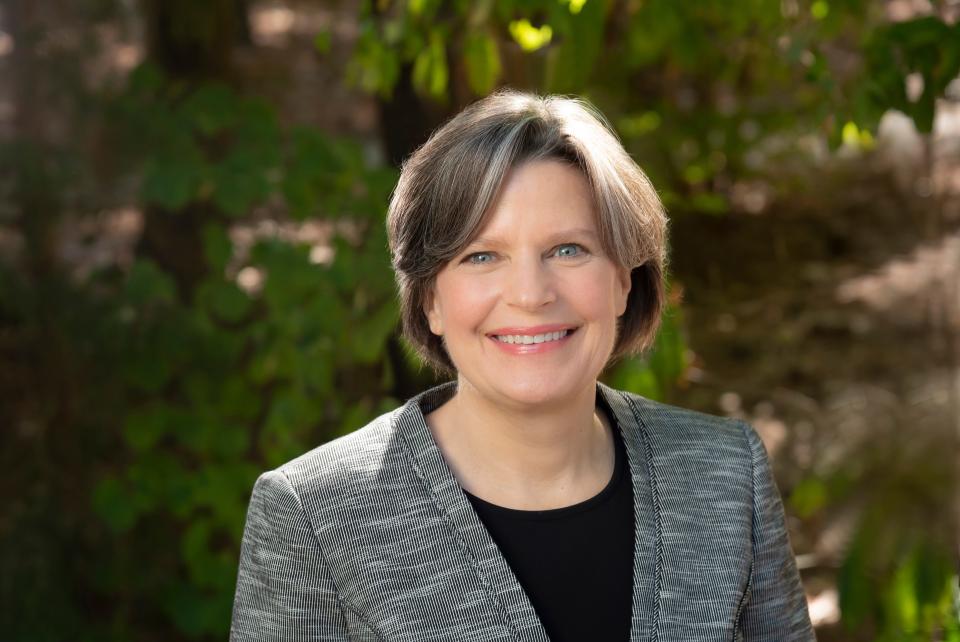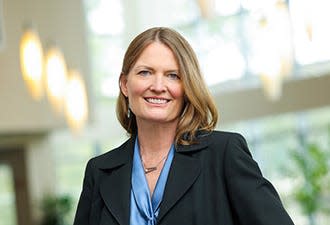Duke lawyers file brief on Hope Mills Facebook flap in upcoming Supreme Court case
Hope Mills is going to the U.S. Supreme Court.
In a sense. The town will be part of the historical record at the nation’s highest court.
A legal dispute over government officials’ use of social media that involved Mayor Jackie Warner is included in an amicus brief that is part of a free speech case to be heard by the court on Oct. 31, which is Halloween.
Earlier this year, Warner settled a case with plaintiff Meg Larson, a former Hope Mills commissioner, that dated to Warner's social media use in 2020 and 2021. Larson alleged in an April 2022 lawsuit the mayor violated public records law by using her personal Facebook page for town business while blocking dozens of people from that page. Warner issued a public apology for her actions at a Jan. 23 board meeting as part of the settlement.

Larson said lawyers with the Duke First Amendment Clinic, which represented her, asked her if they could include details of the Hope Mills case in the amicus. An amicus, which is Latin for “friend of the court,” is written by someone who is not a part of a case but wants to give the court relevant information.
Larson readily agreed to include her case in the brief. She herself had been blocked by the mayor and said the number of people blocked far exceeded what she initially thought.
“This whole fight has been for everyone,” she said. “It was never about me and some vendetta for Jackie, which for many people they have tried to make this about that.
“There is no love lost between Jackie and I, obviously, but this has always been a fight for everyone, for me. Because I think everybody should be able to have a voice. I don’t necessarily approve of people being ugly or calling people horrible names. I do think you should be able to say how you feel about a situation.”

Warner said in a text message on Friday she was not aware of the amicus brief. After receiving a copy of the brief she said she disagreed with its interpretation of why she blocked Larson and other people. She did not have further comment on the details of the brief.
The mayor is seeking her seventh term in the November election in a race against former town commissioner Jessie Bellflowers.
Social media and small NC towns
The First Amendment Clinic, which is part of Duke’s law school, joined First Amendment clinics at universities in Arizona, Illinois and Tennessee in the amicus brief in Lindke v. Freed. The case out of Michigan involves a town manager who blocked a resident from his Facebook page.
On Oct. 31, the Court will hear arguments in that case and another one, O’Connor-Ratcliff v. Garnier. The justices’ decision will be released at a later date, as is standard Court practice.
Amanda Martin with the Duke clinic said the lawyers wrote the brief to help the Court understand “what this looks like from the ground.”

“This isn’t purely an abstract issue,” she said. “A lot of small places — a fair amount of public governing, public communications, public policy works its way out on the pages of social media. We have encountered plenty of towns in North Carolina that have no web presence other than Facebook pages.”
The brief cites philosopher John Stuart Mills and late Supreme Court Justice Oliver Wendell Holmes who believed public discourse is a marketplace of ideas.
“A thwarted debate over the use of publicly owned property in Hope Mills, North Carolina, a small town of about 17,000, offers an illustration,” the brief states. “After a church and parish hall were donated to the Town, a discussion ensued about how to use the property. When Town leaders proposed tearing down the parish hall, Meg Larson and a contingent of citizens posted their objection to that plan on the mayor’s Facebook page.”
The mayor’s decision to delete the comments and block Larson and others created a sanitized “record” that showed only public support for the town’s actions, the brief states.
“Fellow citizens who also favored preservation of the building might think they were alone in their views and self-censor their opinions,” the brief states. “Any hope of building a consensus to change the course of public action is derailed when only one side of a debate is allowed to speak.”
Public business and private pages
Martin said they are not contending Warner should not have a personal page.
“I think she absolutely should if she wants one,” she said. “Just that the two things should be kept separate.”
She said the courts had not yet issued legal clarification on whether public business handled on a private social media page is subject to public records laws.
“As a policy matter we think it’s a much better idea for public officials to keep those two things as rigorously separated as they can,” she said, “so they don’t run into these issues.
“But that is certainly not the law, I just think it’s best practices.”
Settlement and apology
Prior to the case settled this year, Warner in April 2021 had sued Larson and county resident Michael Smith over a parody page about her. A superior court judge dismissed the suit in July of the same year.
Sarah Ludington, director of the Duke clinic, said it was in preparing for that case that the lawyers found other people had been blocked besides Larson.

Before Warner's public apology at the start of the January board meeting, she said her statement had been written “by the attorney and probably the plaintiff.”
But according to Ludington, “That, interestingly, was not correct.”
She and Martin said they do not want the public to get the impression they put words in the mayor’s mouth.
“It was drafted first by her attorney, and we tweaked it and agreed on it, and she read it out loud,” Ludington said.
Warner said about the lawyers' interpretation of her words: “I said that they probably had a role in the language along with the plaintiff, and their comment that they tweaked the language shows that to be correct.“
Small towns and machines
Larson says the other cities cited in the amicus brief were places larger than Hope Mills. Sometimes it is more difficult for people to speak out in small-town America, she said, particularly if they are up against the “machine” of government and politics and “you have the big fish, small pond syndrome.”
She said: “The Warners have a history here, and not just Jackie, but Alex (a former member of the N.C. General Assembly).”
She called her Duke clinic lawyers amazing for their work on her cases.
“I really lucked out with Sarah and Amanda,” she said. “They’re my machine.”
Note: Live audio of U.S. Supreme Court proceedings is available online.
Myron B. Pitts can be reached at mpitts@fayobserver.com or 910-486-3559.
This article originally appeared on The Fayetteville Observer: Free speech case set at Supreme Court has Hope Mills add-on

